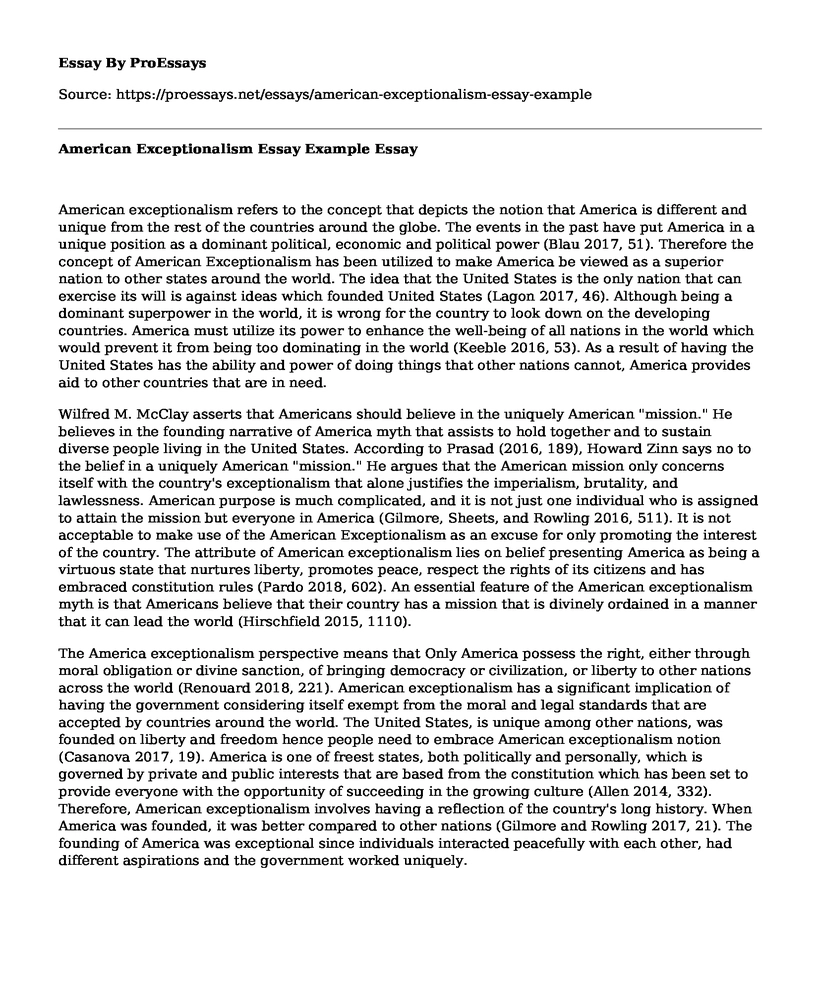American exceptionalism refers to the concept that depicts the notion that America is different and unique from the rest of the countries around the globe. The events in the past have put America in a unique position as a dominant political, economic and political power (Blau 2017, 51). Therefore the concept of American Exceptionalism has been utilized to make America be viewed as a superior nation to other states around the world. The idea that the United States is the only nation that can exercise its will is against ideas which founded United States (Lagon 2017, 46). Although being a dominant superpower in the world, it is wrong for the country to look down on the developing countries. America must utilize its power to enhance the well-being of all nations in the world which would prevent it from being too dominating in the world (Keeble 2016, 53). As a result of having the United States has the ability and power of doing things that other nations cannot, America provides aid to other countries that are in need.
Wilfred M. McClay asserts that Americans should believe in the uniquely American "mission." He believes in the founding narrative of America myth that assists to hold together and to sustain diverse people living in the United States. According to Prasad (2016, 189), Howard Zinn says no to the belief in a uniquely American "mission." He argues that the American mission only concerns itself with the country's exceptionalism that alone justifies the imperialism, brutality, and lawlessness. American purpose is much complicated, and it is not just one individual who is assigned to attain the mission but everyone in America (Gilmore, Sheets, and Rowling 2016, 511). It is not acceptable to make use of the American Exceptionalism as an excuse for only promoting the interest of the country. The attribute of American exceptionalism lies on belief presenting America as being a virtuous state that nurtures liberty, promotes peace, respect the rights of its citizens and has embraced constitution rules (Pardo 2018, 602). An essential feature of the American exceptionalism myth is that Americans believe that their country has a mission that is divinely ordained in a manner that it can lead the world (Hirschfield 2015, 1110).
The America exceptionalism perspective means that Only America possess the right, either through moral obligation or divine sanction, of bringing democracy or civilization, or liberty to other nations across the world (Renouard 2018, 221). American exceptionalism has a significant implication of having the government considering itself exempt from the moral and legal standards that are accepted by countries around the world. The United States, is unique among other nations, was founded on liberty and freedom hence people need to embrace American exceptionalism notion (Casanova 2017, 19). America is one of freest states, both politically and personally, which is governed by private and public interests that are based from the constitution which has been set to provide everyone with the opportunity of succeeding in the growing culture (Allen 2014, 332). Therefore, American exceptionalism involves having a reflection of the country's long history. When America was founded, it was better compared to other nations (Gilmore and Rowling 2017, 21). The founding of America was exceptional since individuals interacted peacefully with each other, had different aspirations and the government worked uniquely.
Bibliography
Allen, Robert C. "American exceptionalism as a problem in global history." The Journal of Economic History 74, no. 2 (2014): 309-350.
Blau, Judith. "The Paradox of American Exceptionalism." In The Paris Agreement, pp. 45-56. Palgrave Macmillan, Cham, 2017.
Casanova, Jose. "Beyond European and American exceptionalisms: Towards a global perspective." In Predicting religion, pp. 17-29. Routledge, 2017.
Gilmore, Jason, and Charles M. Rowling. "The United States in decline? Assessing the impact of international challenges to American exceptionalism." International Journal of Communication 11 (2017): 21.
Gilmore, Jason, Penelope Sheets, and Charles Rowling. "Make no exception, save one: American exceptionalism, the American presidency, and the age of Obama." Communication Monographs 83, no. 4 (2016): 505-520.
Hirschfield, Paul J. "Lethal policing: Making sense of American exceptionalism." In Sociological Forum, vol. 30, no. 4, pp. 1109-1117. 2015.
Keeble, Arin. "Won't bow: Don't know how: Treme, New Orleans, and American exceptionalism." European Journal of American Culture 35, no. 1 (2016): 51-67.
Lagon, Mark P. "Reflections on global justice and American exceptionalism: the United States as a model for the world?." World Affairs 180, no. 1 (2017): 42-63.
Pardo, Bryce. "American exceptionalism and the failure to learn from mistakes of the past." Addiction 113, no. 4 (2018): 602-603.
Prasad, Monica. "American Exceptionalism and the Welfare State: The Revisionist Literature." Annual Review of Political Science 19 (2016): 187-203.
Renouard, Joe. "American Exceptionalism Reconsidered: US Foreign Policy, Human Rights, and World Order by David P. Forsythe & Patrice C. McMahon." Human Rights Quarterly 40, no. 1 (2018): 219-225.
Cite this page
American Exceptionalism Essay Example. (2022, May 26). Retrieved from https://proessays.net/essays/american-exceptionalism-essay-example
If you are the original author of this essay and no longer wish to have it published on the ProEssays website, please click below to request its removal:
- Why Culture Is Important to Understanding Communication? - Essay Sample
- Politics of Aids Policy Growth in South Africa Essay
- Congress Budget and Strategy of the Opioid Epidemic Paper Example
- Methods of Communication in the Organization Essay Example
- Essay Sample on Media Influence on Society
- Planning For Your Future - Essay Sample
- What are the Political, Social, or Economic Impacts of Humanoids on Our Society? - Report Sample







